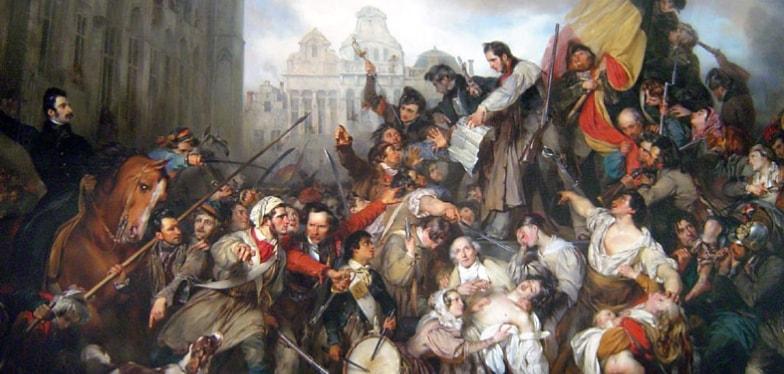Did The Dumb Girl of Portici really set off the Belgian Revolution in 1830?

At school we learned that, on Wednesday 25 August 1803 during the performance of the opera La Muette de Portici (The Dumb Girl of Portici) in La Monnaie opera house in Brussels, riots broke out against the Dutch rulers, a conflict that directly led to Belgian independence. In reality, the opera was just the fuse that lit the powder keg.
The revolution had much deeper origins. After the fall of Napoleon and during the Congress of Vienna in 1815, the former Austrian Netherlands, the old principality of Liege and the Grand Duchy of Luxembourg were combined with the provinces from the former Republic to form the United Kingdom of the Netherlands. This new kingdom was meant to create the ideal buffer state to block any further aspirations of power from France. Initially, the economy flourished thanks to incentives from William I of Orange, but a recession began in the late 1820s. High taxes on basic commodities caused growing dissatisfaction among the proletariat. Furthermore, the monarch's authoritarian and wilful rule caused controversy, many of the Catholic southerners were unhappy with the fact that William I was a protestant and the French elite were annoyed by the Dutch-speaking government. Add to that the impact of the French revolution in July plus the many political exiles who had settled in Brussels over previous years and came to add further fuel to the fire. Until the whole pan caught fire!
Despite rising tensions in the weeks beforehand, the government still decided to allow the performance of the planned opera to go ahead, marking the birthday of William I just before. People feared ‘very fervent outbursts’ and ‘some rowdy behaviour’ during the performance. However, not a word was said about the posters in the city announcing the ‘festive programme’ as: Monday: fireworks - Tuesday: festive lighting - Wednesday: REVOLUTION! The evening's events were probably orchestrated. Handfuls of young people, mostly well-to-do citizens, waited until the moment of the aria Amour sacré de la Patrie (Sacred Love of the Fatherland) to rise up against the king's rule. After the tempestuous applause and cries of Vive la liberté! and Vive la France, the audience ran onto the streets, whether or not spontaneously. After much rioting, destruction, arson, failed negotiation and violent acts, independence was declared on 4 October.
Now, who was this Dumb Girl of Portici in fact? She was Fenella, a poor, young, mute girl from a fisherman's family in the village of Portici near Naples. She was dumped by her rich lover who married a Spanish princess. Her brother, a fisherman, led the revolution against the Spanish oppressors in 1647. The opera was composed by the meanwhile forgotten Frenchman Daniel François Esprit Auber (1782-1871). In his day, however, he attracted a full house both in Paris and Brussels.